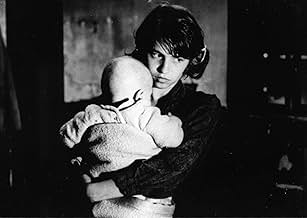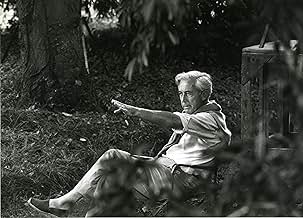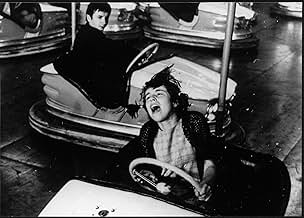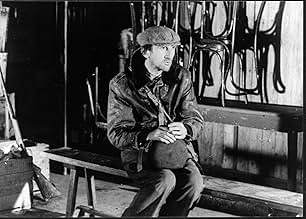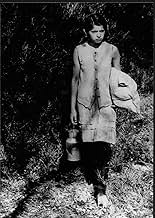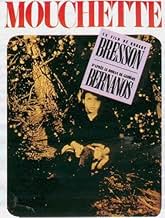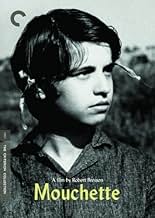CALIFICACIÓN DE IMDb
7.7/10
14 k
TU CALIFICACIÓN
Agrega una trama en tu idiomaA young girl living in the French countryside suffers constant indignities at the hand of alcoholism and her fellow man.A young girl living in the French countryside suffers constant indignities at the hand of alcoholism and her fellow man.A young girl living in the French countryside suffers constant indignities at the hand of alcoholism and her fellow man.
- Dirección
- Guionistas
- Elenco
- Premios
- 5 premios ganados y 1 nominación en total
- Dirección
- Guionistas
- Todo el elenco y el equipo
- Producción, taquilla y más en IMDbPro
Opiniones destacadas
Until now Robert Bresson has been one of those classic directors who have failed to connect with me. With Au Hasard Balthazar and Pickpocket, I've found his style over-simplified, bland and plodding. While Balthazar didn't work for me at all, Pickpocket had moments where it showed potential but then it was quickly squandered and taken in a different direction. Here with Mouchette, his style is finally working. It's a film utterly drenched in sorrow and pain. Through the protagonists' squirming and rebelling from her struggles, her actions are a catharsis from the frustrations of life and when she's punished for them, it digs deep. Although the storytelling techniques are similar to the films I didn't care much for, what elevates Mouchette is the passionate performances and the crisp photography. While I do regret that it's so brief, Mouchette is a brilliant portrayal of a truly tragic figure that faces the hardships and inevitable moral dilemmas of life. I'm very glad Bresson has warmed up to me as he's got many films I'm really looking forward to, such as A Man Escaped and Lancelot du Lac.
8/10
8/10
My Rating : 9/10
Bresson is heralded as an important filmmaker in world cinema. I absolutely love 'Mouchette' and it is a masterpiece of world cinema. It was on Tarkovsky's top 10 films list he made for Sight & Sound.
Bresson's other famous film Au Hasard Balthasar and Mouchette have common themes of abuse and negligence of the main characters. This film has the formal inevitability of tragedy, and is soaked through with a species of lyrical, desperate sadness. This quality, and the compelling aesthetic seriousness with which Bresson addresses his themes of suffering, compassion and the rural poor, are very remarkable indeed. Mouchette is a visionary, poetic film, fraught with elusive, unsettling meanings: a classic cinematic text.
Bresson is heralded as an important filmmaker in world cinema. I absolutely love 'Mouchette' and it is a masterpiece of world cinema. It was on Tarkovsky's top 10 films list he made for Sight & Sound.
Bresson's other famous film Au Hasard Balthasar and Mouchette have common themes of abuse and negligence of the main characters. This film has the formal inevitability of tragedy, and is soaked through with a species of lyrical, desperate sadness. This quality, and the compelling aesthetic seriousness with which Bresson addresses his themes of suffering, compassion and the rural poor, are very remarkable indeed. Mouchette is a visionary, poetic film, fraught with elusive, unsettling meanings: a classic cinematic text.
Just like I remembered. The face of Nadine Nortier has not changed. The unbelievable "Mouchette" in this unforgettable Robert Bresson masterpiece. I hadn't seen the film since I was a teen ager. I saw it again last night and as if by magic it felt more contemporary today than it did then and then, let me tell you, it felt pretty real in its own rigorous lyrical style. What a shockingly wonderful effect a film like this could have on teen agers today. To stay with a character who takes us with nothing more than her naked truth through a landscape of absolute desolation. Her innocence intact, in spite of the outrage. Her ultimate act as breathtaking as anything we have ever seen on the screen, before or since. I tried to show the film to a group of twentysomethings, all of them walked away within the first fifteen minutes. All except one, a boy of 21, he had escaped Bosnia with his brother a few short years ago. As the film ended I looked at him. He was silent. He spoke without looking at me "can I see it again?" That's at the center of the experience that provides this film. "Mouchette" is meant for everyone, but it'll touch only some.
Among the best things that can happen to me as a viewer is to watch a filmmaker grow into mastery, and I've just gone through a series of viewing where Bresson grew before my eyes. He wasn't a master before Balthazar in my estimation but he was one now.
See, he had started with ambitious work in Diary of a Priest, but something must have troubled him, the spiritual search was coming off as emotional anguish, resulting in sentimentality. His next three were all about finding ways to quell this, fasting the eye, muting the emotion.
This is all the more reason to celebrate him, because it could have gone either way. He could have turned out film after film where he mutes expression and turns actors into bare stumps and called it pure. But if this was purity, where was the life in which the pure is woven through? Bresson matters I believe because he left the stone floor of his ascetic phase to grow into this, his sculpting phase.
This is a sculpture of moving image and sound, even more so than Balthazar, even more purely about the rooms and spaces in which a young girl faces the duplicity of life. It's all in how he chisels the air with the camera, he does this in three parts.
The day before, with its moments of small everyday cruelty and unexpected kindness alike. She has a beautiful voice but won't sing with her classmates until forced, a passing woman unexpectedly gives her money for the bumping cars, but her dalliance with a boy is cut short and she has to go sit with her father. It's heart-aching because all she needs is someone to mind her and no one does outside of making her behave how they want to, most of us have been savaged this way as kids.
The night of unfathomable emotions out in the woods, and look how masterfully. Why she does what she does in the cabin, why she swears to protect his secret and professes love, perhaps intuitively protecting herself, perhaps asserting herself against authority, this is all as unfathomable as why the man goes back out to commit violence. It's all in that shot where the two men laugh, for no reason other than all this being absurd, beneath a dark sky, and the wind that blows all through the night.
In the third part of the film we have the day after, with this complicated human nature brought to the stark light of what other people think. Bresson shows us judgment and cynicism, and even the old woman's advice about death is waved off; too musty for a young girl, more advice.
So how poignant to see this shift in Bresson? He gives us by the end a more eloquent Jeanne D'arc, now the dogmatist interrogators become your small-minded neighbors and Joan is neither pure nor certain in any way about the truth of what she experienced. No ceremonial death. And how deep it cuts, that she may have wanted to ask her mother for advice, unburden the confusion, but has to go through it alone.
So after a series of Bresson viewings, I will come to rest here. Antonioni would take home the Palm that year but Bresson had conquered his obstacles and arrived fully. The title of Tarkovsky's book best describes what he does here, and you can see the Tati influence as a new tool that he didn't have back in Pickpocket. He sculpts an external time, but now in such a way that the pure is found where it grows roots and rustles, among life.
It would be Tarkovsky's turn now to shoulder this legacy, and Dreyer's, asking himself, what kind of time? We dream and yearn with an asymmetric logic and mingle with our reflection. It would be one of the great leaps in the cinema but for that we'd have to go forward.
See, he had started with ambitious work in Diary of a Priest, but something must have troubled him, the spiritual search was coming off as emotional anguish, resulting in sentimentality. His next three were all about finding ways to quell this, fasting the eye, muting the emotion.
This is all the more reason to celebrate him, because it could have gone either way. He could have turned out film after film where he mutes expression and turns actors into bare stumps and called it pure. But if this was purity, where was the life in which the pure is woven through? Bresson matters I believe because he left the stone floor of his ascetic phase to grow into this, his sculpting phase.
This is a sculpture of moving image and sound, even more so than Balthazar, even more purely about the rooms and spaces in which a young girl faces the duplicity of life. It's all in how he chisels the air with the camera, he does this in three parts.
The day before, with its moments of small everyday cruelty and unexpected kindness alike. She has a beautiful voice but won't sing with her classmates until forced, a passing woman unexpectedly gives her money for the bumping cars, but her dalliance with a boy is cut short and she has to go sit with her father. It's heart-aching because all she needs is someone to mind her and no one does outside of making her behave how they want to, most of us have been savaged this way as kids.
The night of unfathomable emotions out in the woods, and look how masterfully. Why she does what she does in the cabin, why she swears to protect his secret and professes love, perhaps intuitively protecting herself, perhaps asserting herself against authority, this is all as unfathomable as why the man goes back out to commit violence. It's all in that shot where the two men laugh, for no reason other than all this being absurd, beneath a dark sky, and the wind that blows all through the night.
In the third part of the film we have the day after, with this complicated human nature brought to the stark light of what other people think. Bresson shows us judgment and cynicism, and even the old woman's advice about death is waved off; too musty for a young girl, more advice.
So how poignant to see this shift in Bresson? He gives us by the end a more eloquent Jeanne D'arc, now the dogmatist interrogators become your small-minded neighbors and Joan is neither pure nor certain in any way about the truth of what she experienced. No ceremonial death. And how deep it cuts, that she may have wanted to ask her mother for advice, unburden the confusion, but has to go through it alone.
So after a series of Bresson viewings, I will come to rest here. Antonioni would take home the Palm that year but Bresson had conquered his obstacles and arrived fully. The title of Tarkovsky's book best describes what he does here, and you can see the Tati influence as a new tool that he didn't have back in Pickpocket. He sculpts an external time, but now in such a way that the pure is found where it grows roots and rustles, among life.
It would be Tarkovsky's turn now to shoulder this legacy, and Dreyer's, asking himself, what kind of time? We dream and yearn with an asymmetric logic and mingle with our reflection. It would be one of the great leaps in the cinema but for that we'd have to go forward.
Mouchette is a young girl living in the country. Her mother is dying and her father does not take care of her. Mouchette remains silent in the face of the humiliations she undergoes. One night in a wood, she meets Arsene, the village poacher, who thinks he has just killed the local policeman. He tries to use Mouchette to build an alibi.
Robert Bresson knows how to make anything look beautiful. I always feel that black and white captures a scene better than color ever will, especially if the director (or cinematographer) knows how to really use the light and shadow Bresson gets it, and has always gotten it. He also seems to know ho to use children without exploiting them or making them overly sympathetic characters. The character of Mouchette is in many ways the queen of her own world... even if it may not be the best world.
Robert Bresson knows how to make anything look beautiful. I always feel that black and white captures a scene better than color ever will, especially if the director (or cinematographer) knows how to really use the light and shadow Bresson gets it, and has always gotten it. He also seems to know ho to use children without exploiting them or making them overly sympathetic characters. The character of Mouchette is in many ways the queen of her own world... even if it may not be the best world.
¿Sabías que…?
- TriviaIt was rumored for years that the trailer for this film was by Jean-Luc Godard, and he has recently confirmed this by programming it in a self-curated retrospective of his work. The trailer is virtually a miniature essay on (or subversion of) the film, jarringly inter-cutting excerpts from it with a written commentary that calls it "Christian and sadistic."
- Errores(at around 1 min) The canteen changes position after being dropped.
- ConexionesEdited into Bande-annonce de 'Mouchette' (1967)
- Bandas sonorasMagnificat
Written by Claudio Monteverdi
Performed by Les Chanteurs de St. Eustache
Conducted by R.P. Émile Martin
Selecciones populares
Inicia sesión para calificar y agrega a la lista de videos para obtener recomendaciones personalizadas
- How long is Mouchette?Con tecnología de Alexa
Detalles
- Tiempo de ejecución1 hora 21 minutos
- Color
- Mezcla de sonido
- Relación de aspecto
- 1.66 : 1
Contribuir a esta página
Sugiere una edición o agrega el contenido que falta

